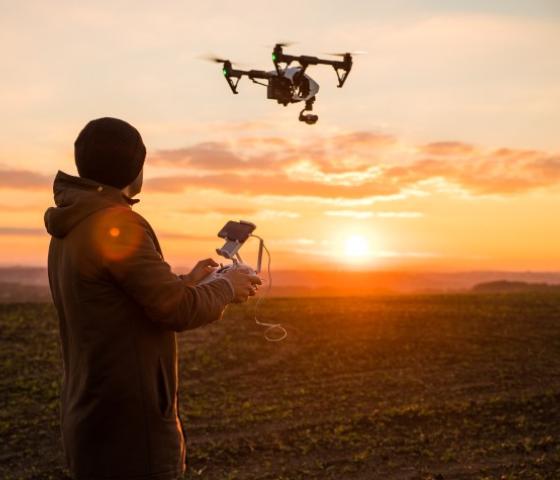AVI30419 Certificate III in Aviation (Remote Pilot)
Master the art of professional drone flying
Gain skills for roles such as a Commercial Licensed Drone Pilot, which is integral to performing many important operations requiring an ‘eye in the sky.’

Overview
Campus Collie
When Semester 1, 2026
Study Mode On Campus | Part-Time
A drone is a robotic aircraft controlled remotely and drone piloting has become an in-demand skill that can open the door to many rapidly evolving fields. Gain skills for roles such as a Commercial Licensed Drone Pilot, which is integral to performing many important operations requiring an ‘eye in the sky.’
Drones can facilitate delivery of medical and food supplies to remote areas and assist in emergency situations such as bushfires or shark spotting and military support. The agricultural, mining, oil and gas industries use drones to for surveying and wildlife conservation, and drones also have high creative capability for photography for weddings and tourism.
Note: this is a professional qualification and not a recreational qualification; this course provides you with training to legally operate a remotely piloted aircraft. This qualification will also permit you to fly without many of the operating restrictions applied to recreational users.
To make an informed choice about the suitability of this course, please consider the essential skills and knowledge below. You must:
- Have a strong interest is drone operation.
- Be technically minded and have creative thinking skills.
- Enjoy problem solving.
- Demonstrate well-developed digital literacy skills and a basic understanding of mathematics.
- Have well-developed time-management skills.
- Show your ability to read and interpret instructions/signs/meters.
- Demonstrate your ability to write documents legibly.
- Have a sound level of fitness to manage physical demands in the workplace, such as lifting, bending, and kneeling.
- Show your ability to follow instructions and comply with licencing requirements.
Drones are a remotely operated robotic aircraft and piloting them has become an in-demand skill. They play a vital role in delivering medical supplies and food to remote areas, and are invaluable in emergency situations such as bushfires, shark spotting, and military operations. Industries like agriculture, mining, oil, and gas use drones for surveying and monitoring, while conservationists employ them for wildlife tracking. Drones also offer immense creative potential, especially in photography for weddings, tourism, and media production.
South Regional TAFE is not authorised to assess students for the requirements of the Remote Pilot Licence (RPL) or the Aeronautical Radio Operator Certificate (AROC). Once you have completed your Certificate III in Aviation, you will be required to sit these assessments externally.
Time Commitment: You will need to allocate appropriate time to complete this course. This includes attending classes on-site and/or online as outlined in the study mode; and undertake independent study outside of class hours, including private study, assessment preparation, research, and complete assessment requirements.
Below are some of the important personal skills you will be required to develop and demonstrate during training. These skills are highly valued by industry:
- Respectful Communication: Engage effectively with people from diverse backgrounds, communicate ideas clearly, and foster trust and strong relationships.
- Teamwork: Work collaboratively, treat others with respect, and remain open to constructive feedback.
- Problem Solving: Proactively find solutions, engage with challenges, ask questions, and respond appropriately within your scope of practice.
- Initiative: Stay motivated, take initiative, and seek help when needed.
- Planning: Manage time well. Prioritise and complete tasks efficiently and effectively.
- Self-Management: Reflect on your performance. Acknowledge your success and take responsibility for your shortcomings.
- Learning: Recognise your strengths while embracing new knowledge and experiences to support personal and professional growth.
- Technology: Adapt to new tools, access digital resources, and integrate technology into your learning.
Important information
Select your preferred campus and apply
Semester 1, 2026
Details
Course fees
| Tuition | Resource | Total fee* | |
|---|---|---|---|
| General | $1,170.00 | $193.80 | $1,363.80 |
| Concession | $349.20 | $193.80 | $543.00 |
Indicative Fees and Charges
The fees quoted are estimates only and are for all units in the course for students enrolling on a full-time basis. If you're a student that has successfully completed a lower-level qualification that is a prerequisite for this course, you'll only pay for the units that you need to enrol in to complete this course. Please view the full list of Fee Disclaimers
Units
Not all units and study modes are offered at all campuses. Please check with your local campus.
Core
| National ID | Unit title |
|---|---|
| AVIF0021 | Manage human factors in remote pilot aircraft systems operations |
| AVIH0006 | Navigate remote pilot aircraft systems |
| AVIW0004 | Perform operational inspections on remote operated systems |
| AVIW0028 | Operate and manage remote pilot aircraft systems |
| AVIY0023 | Launch, control and recover a remotely piloted aircraft |
| AVIY0027 | Operate multi-rotor remote pilot aircraft systems |
| AVIY0031 | Apply the principles of air law to remote pilot aircraft systems operations |
| AVIY0052 | Control remote pilot aircraft systems on the ground |
| AVIY0053 | Manage remote pilot aircraft systems energy source requirements |
| AVIZ0005 | Apply situational awareness in remote pilot aircraft systems operations |
Elective
| National ID | Unit title |
|---|---|
| AVIE0003 | Operate aeronautical radio |
| AVIE0005 | Complete a Notice to Airmen (NOTAM) |
| AVIH0007 | Operate remote pilot aircraft systems under night visual line of sight (NVLOS) |
| AVIH0008 | Operate remote pilot aircraft systems in extended visual line of sight (EVLOS) |